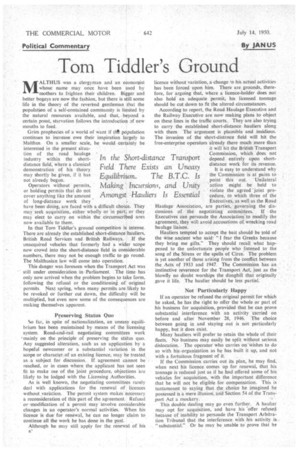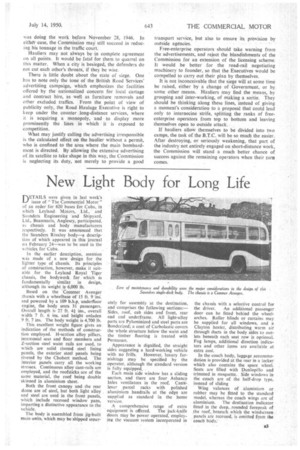Torn Tiddler's Ground
Page 36

Page 37

If you've noticed an error in this article please click here to report it so we can fix it.
By JAN US
MALTHUS was a clergyman and an economist whose name may once have been used by mothers to frighten their children. Bigger and better bogeys are now the fashion, but there is still some life in the theory of the reverend gentleman that the
population of a self-contained community is limited by the natural resources available, and that, beyond a certain point, starvation follows the introduction af new mouths to feed.
Grim prophecies of a world of want if tht population continues to increase owe their inspiration largely to Malthus. On a smaller scale, he would certainly be interested in the present situation of the road haulage industry within the shortdistance field, where a classical demonstration of his theory may shortly be given, if it has not already begun.
Operators without permits, or holding permits that do not cover anything like the amount of long-distance work they ' have been doing, are faced with a difficult choice. They may Seek acquisition, either wholly -or in part, or they may elect to 'carry on within the circumscribed area now available to them.
In that Tom Tiddler's ground competition is intense. There are already the established short-distance hauliers, British Road Services and British Railways. If the unacquired vehicles that formerly had a wider scope now crowd into the short-distance field in considerable numbers, there may not be enough traffic to go round. The Malthusian law will come into operation.
This danger was foreseen when the Transport Act was still under consideration in Parliament. The time has only now arrived when the problem begins to take form, following the refusal or the conditioning of original permits. Next spring, when many permits are likely to be revoked or further cut down, the difficulty will be multiplied, but even now some of the consequences are making themselves apparent.
Preserving Status Quo So far, in spite of nationalization, an uneasy equilibrium has been maintained by. means of the licensing system. Road-and-rail negotiating committees work *mainly on the principle of preserving the status quo. Any suggested alteration, such as an application by a hopeful newcomer or a substantial variation in the scope or characterof an existing licence may be treated. as a subject for discussion. If agreement cannot be reached, or in cases where the applicant has not seen fit to make use of the joint procedure, objections are likely to be lodged with the Licensing Authorities.
As is well known, the negotiating committees rarely deal with applications for the renewal of licences without variation. The permit system makes necessary a reconsideration of this part of the agreement. Refusal ormodification of a permit may 'involve considerable changes in an operator's normal activities. When his licence is due for renewal, he can no longer claim t0. continue all the work he has done in the past . .
Although he may still apply for the renewal of his a' licence without variation, a change in his actual activities has been forced, upon him. There are grounds, therefore, for arguing that, where a licence-holder does not also hold an adequate permit, his licensed tonnage should be cut down to fit the altered circumstances.
-According to report, the Road Haulage Executive and the Railway Executive are now making plans to object on these lines in the traffic courts. They are also trying to carry the established short-distance hauliers along with them The argument is plausible and insidious, The invasion of the short-distance field will hit the free-enterprise operators already there much more than it will hit the British Transport Commission., which does not depend entirely upon shortdistance work for its revenue.
It is easy to understand why the Commission is at pains to point this out. 'Unilateral action might be held to violate the agreed joint procedure, to which three of the Executives, as well as the Road Haulage Association, are parties, governing the disCussions of the negotiating committees. If the Executives can persuade the Assockttion. to modify the agreement, they will avoid accusations of wrecking road haulage liaison.
Hauliers tempted to accept the bait shouldbe told of the wise ancient who said "1 fear the Greeks because they bring me gifts." .They should recall what happened to the unfortunate people who listened to the song of the Sirens or the spells of Circe. The problem is yet another of those arising from the Conflict hetween the Acts of 1933 and 1947. The Commission has an instinctive reverence for the Transport Act, just as the blowfly no doubt worships' the dimghill that originally gave it life. The haulier should be less .partial: Not • Particularly Happy
If an operator be refused the original permit for which he asked, he has the right to offer the whole or part of his business for acquisition, provided that he can prove substantial interference with an activity carried on before and after November 28, 1946. The choice between going in and staying out is not particularly happy, but it does exist.
Many hauliers will prefer to retain the whole of their fleets. No business may easily be split without serious dislocation. The operator who carries on Wishes to do so with his.organization as he has built it up, and not with a fortuitous fragment of it.
If the Commission carries out its plan, he may find, when next his licence comes up for renewal, that his tonnage is reduced just as if he had offered some of his vehicles for acquisition, with the important difference that he will not be eligible for compensation. This is tantamount to saying that the choice he imagined he possessed is a mere illusion, and Section 54 of the Transport Act a mockery. This double dealing may go even further. A haulier May opt for acquisition, and have his 'offer refused beCause Of inability to persuade the Transport Arbitration Tribunal that the interference, with his activity is "substantial." Or he may be unable to prove that he was doing the work before November 28, 1946. In either case, the Commission may still succeed in reducing his tonnage in the traffic court.
Hauliers may not always be.in complete agreement on all points. It would be fatal for them to quarrel on this matter. When a city is besieged, the defenders do not cut each other's throats, if they be wise.
There is little doubt about the state of siege. One has to note only the tone of the British Road Services' adverti§ing campaign, which emphasizes the facilities offeredby the nationalized concern for local cartage and contract hire, as well as furniture removals and other excluded traffics. From the point of view of publicity only, the Road Haulage Executive is right to keep under the counter long-distance services, where it is acquiring a monopoly, and to display more prominently the lines in which it is exposed to competition.
What may justify calling the advertising irresponsible is the calculated effect on the haulier without a permit, who is confined to the area where the main bombardment is directed. By allowing the extensive advertising of its satellite to take shape in this way, the Commission is neglecting its duty, not merely to provide a good transport service, but also to ensure its, provision by outside agencies.
Free-enterprise operators should take warning from the advertisements, and reject the blandishments of the Commission for an extension of the licensing scheme. It would be better for the road-rail negotiating machinery to founder, so that the Executives would be compelled to carry out their plan by themselves.
It is not inconceivable that the siege will at some time be raised, either by a change of Government, or by some other means. Hauliers may find the means, by grouping and inter-working, of making a sortie. They should be thinking along these lines, instead of giving a moment's consideration to a proposal that could lead only to internecine strife, splitting the ranks of freeenterprise operators from top to bottom and leaving themselves open to outside attack.
If hauliers allow themselves to be divided into two camps, the task of the B.T.C. will be so much the easier. After destroying, or seriously weakening, that part of the industry not entirely engaged on short-distance work, the Commission will stand a much better chance of success against the remaining operators when their turn comes.












































































